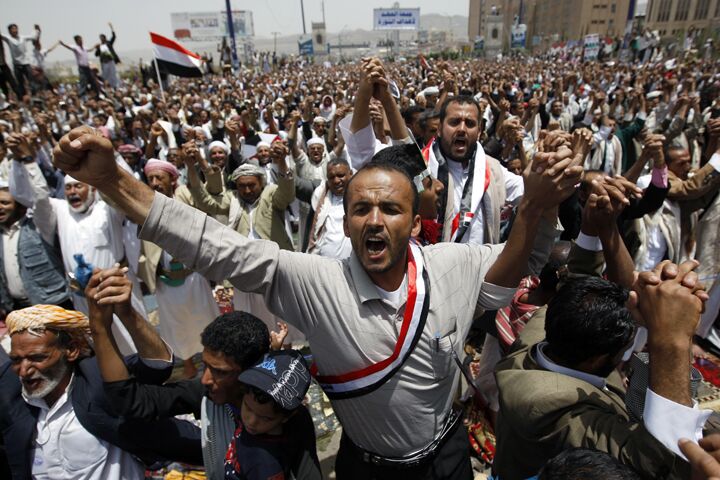
Is Yemen Sliding Toward Anarchy?
Two weeks after Yemen’s President Ali Abdullah Saleh was taken to Saudi Arabia for medical treatment after being injured in an explosion on June 3, it is still unclear what his departure means for the future leadership of the country. Officials in his regime say he will return to Yemen, while other onlookers believe that unlikely. In the meantime, violent clashes continue and opposition parties and the international community are hoping to force a power transition in Yemen without the country falling to civil war.
On Tuesday, large-scale protests were held in nearly every city in the country, with hundreds of thousands of demonstrators calling for Saleh’s family and close aides to be brought to trial and for a transitional governing council to be formed.
Wednesday, Islamist militants—reportedly including al Qaeda members—attacked the southern city of Houta, seizing control of several neighborhoods. Islamic insurgents already captured two other southern cities last month.
If the security and governance situation in Yemen further deteriorates, the failed state will provide an even greater haven for al Qaeda and also Iranian-linked operatives. With the country critically situated at the opening of the Red Sea from the Gulf of Aden, a crucial shipping lane, the stakes are high.
As such, Iran would be quite happy for Saudi Arabia and the other countries involved to fail to contain the crisis and secure a power-sharing agreement in Yemen. In a highly symbolic and provocative move, Tehran announced on June 8 that it had deployed submarines just off the coast of Yemen in the Red Sea, close to where much of the fighting between government troops and Islamists has been taking place. This move, says Stratfor, allows Iran “to flex its muscles at a time when each and every one of its Arab rivals are dealing with internal crises” (June 8). Stratfor also reports that the Saudis are on guard for possible Iranian attempts to escalate the ongoing Shiite Houthi insurgency in the borderland between Saudi Arabia and Yemen, which Tehran has been aiding.
With all the many factions competing for power, Daniel Pipes, director of the Middle East Forum, believes anarchy, after the sort in Somalia and Afghanistan, is more likely than civil war. “Yemeni Islamists range from members of the Islah party, which competes in parliamentary elections, to the Houthi rebels fighting Saudi forces, to al Qaeda in the Arabian Peninsula. Their growing power boosts the Iranian-backed ‘resistance bloc’ of states and organizations,” he writes.
Columnist Joel Hilliker wrote back in March that the fall of the Yemeni government, “in addition to being a blow to America and a potential boon to terrorists, would likely challenge the region’s balance of power by pitting its two biggest powers—Saudi Arabia and Iran—against each other all the more.”
This is already happening.
As Mr. Hilliker wrote, “Amid the flurry of earthshaking headlines, keep an eye on Yemen! It is vividly highlighting the Bible’s prophecy of the Iranian ‘king of the south’ pushing its way into a war that will engulf the whole region—and eventually the world.”
